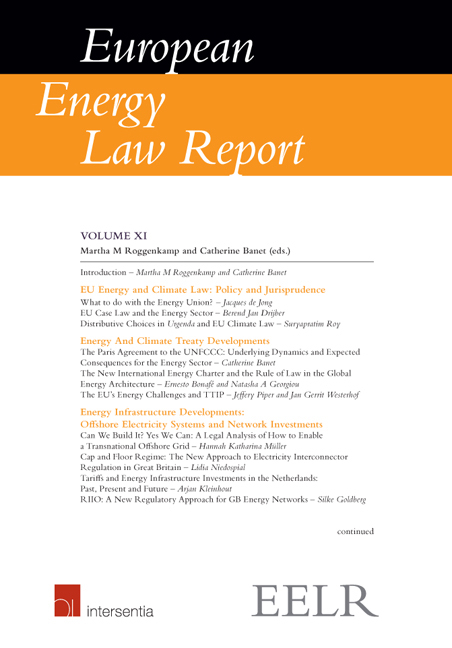Book contents
- Frontmatter
- Editorial
- Contents
- List of Abbreviations
- List of Contributors
- Introduction
- Part I EU Energy and Climate Law: Policy and Jurisprudence
- Part II Energy and Climate Treaty Developments
- Part III Energy Infrastructure Developments: Offshore Electricity Systems and Network Investments
- Chapter VII Can We Build It? Yes We Can: A Legal Analysis of How to Enable a Transnational Offshore Grid
- Chapter VIII Cap and Floor Regime: The New Approach to Electricity Interconnector Regulation in Great Britain
- Chapter IX Tariffs and Energy Infrastructure Investments in the Netherlands: Past, Present and Future
- Chapter X RIIO: A New Regulatory Approach for GB Energy Networks
- Part IV Heat Supply Legislation in the Eu
- Part V Security of Energy Supply and Safety
Chapter IX - Tariffs and Energy Infrastructure Investments in the Netherlands: Past, Present and Future
from Part III - Energy Infrastructure Developments: Offshore Electricity Systems and Network Investments
Published online by Cambridge University Press: 29 September 2018
- Frontmatter
- Editorial
- Contents
- List of Abbreviations
- List of Contributors
- Introduction
- Part I EU Energy and Climate Law: Policy and Jurisprudence
- Part II Energy and Climate Treaty Developments
- Part III Energy Infrastructure Developments: Offshore Electricity Systems and Network Investments
- Chapter VII Can We Build It? Yes We Can: A Legal Analysis of How to Enable a Transnational Offshore Grid
- Chapter VIII Cap and Floor Regime: The New Approach to Electricity Interconnector Regulation in Great Britain
- Chapter IX Tariffs and Energy Infrastructure Investments in the Netherlands: Past, Present and Future
- Chapter X RIIO: A New Regulatory Approach for GB Energy Networks
- Part IV Heat Supply Legislation in the Eu
- Part V Security of Energy Supply and Safety
Summary
INTRODUCTION
Investments in gas and electricity networks are of vital importance. On the one hand, our society relies heavily on efficient and reliable transmission of gas and electricity. Economic growth, industries and even our day-to-day activities depend on the continuous availability of gas and electricity, which is transported through these networks. On the other hand, this reliable transmission comes with a cost, which much be carefully assessed and set through tariffs. This chapter reviews the situation for infrastructure investments in the Netherlands. Indeed, over the past decades, regulation of infrastructure investments has changed in this country – and without any doubt will change even further in the future. This contribution reviews the past, present and future of the regulation of energy transport infrastructure investments in connection with the tariffs. The focus is on investments by transmission system operators (TSOs) and distribution system operators (DSOs) in the Netherlands. The review is limited to onshore transmission and distribution networks. Investments offshore or upstream are not discussed as they are subject to a different legal framework and ownership structure.
BACKGROUND: WHY REGULATE INVESTMENTS? OR: WHY NOT?
Before discussing in more detail the rules on network investments, it is important to understand why investments in energy transport infrastructures should be regulated. Why not leave this to the system operator? The answer is that system operators in the Netherlands, as in many countries, are in a position of natural monopoly. It is not efficient or desirable to build multiple distribution and transmission grids. This natural monopoly situation is reflected in legislation: save for a few exceptions, transmission may be performed only by designated public system operators. Consumers have no choice between the different system operators, nor are there real alternatives for transmission. As the system operators have a dominant position, there is a risk that this dominant position would be abused.
Generally, the existence of a dominant market position could lead to two types of abuse: exclusionary or exploitative conduct. The first type–excluding competitors from the market–is not relevant, as there is no competition for transmission within the Dutch market. The background of the regulation is the second type of potential abuse–potential exploitative conduct. In particular, the concern behind regulation of investments is that customers end up paying an excessive price, for example, due to overinvestment (‘goldplating’) or inefficient investments.
- Type
- Chapter
- Information
- European Energy Law Report XI , pp. 191 - 206Publisher: IntersentiaPrint publication year: 2017

